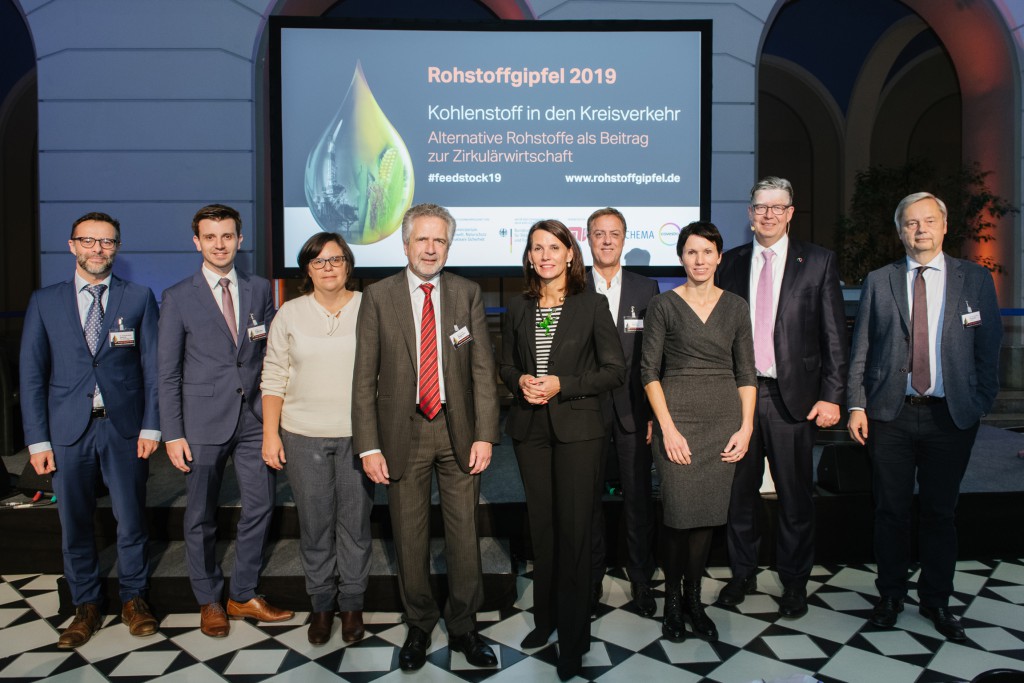With sustainable raw materials from waste, plants and CO2, the chemical industry can support the transition to a circular economy. At the Raw Materials Summit 2019, which took place on Monday at the Technical University of Berlin, Germany representatives from business, politics and science called for the increased use of such sources instead of crude oil. Accordingly, non-fossil resources help to close the carbon loop and can contribute to climate protection. At the summit the “Resource Innovator” start-up prize was awarded to the young company Ineratec from Southern Germany.
“The chemical industry is actively pushing ahead with the transformation to a circular economy,” said Dr. Klaus Schäfer, Member of the Board of Management for Production and Technology at Covestro. The materials manufacturer organized the summit again joinly with the Technical University of Berlin and the Dechema Society for Chemical Engineering and Biotechnology.
Waste as a valuable resource
According to Schäfer, it is particularly important to see plastic waste as a resource: “After their use, products must no longer end up uncontrolled in the environment, but must be recycled in an ecologically efficient manner, for example through chemical recycling”, stated Schäfer with a view to politics.
The German government was represented by Rita Schwarzelühr-Sutter, State Secretary at the Federal Ministry for the Environment, Nature Conservation and Nuclear Safety (BMU), who delivered the opening speach. The BMU as well as the Federal Ministry of Education and Research acted as patrons of the event.
Professor Christian Thomsen, President of the Technical University of Berlin, stressed that the academic sector could provide important impetus for research and development into new recycling processes and alternative raw materials. Thomsen: “The interaction of application-oriented basic research and science-based industry is the key to success”.
Promoting a start-up culture
Professor Kurt Wagemann, Managing Director of Dechema, emphasized the importance of a vibrant start-up scene for the realization of new ideas for sustainable production processes and products: “The start-up culture in Germany needs to be more pronounced so that Germany can keep up with international competition”.
Wagemann also selected the “Resource Innovator 2919”. This year’s prize at the Raw Materials Summit went to Karlsruhe-based Ineratec GmbH, which was founded in 2016. The company has succeeded in downsizing large chemical plants to miniature size. With these decentralized reactors, high-quality raw materials for the chemical industry can be produced from exhaust gases such as CO2.

About the Technical University of Berlin
With around 34,500 students, around 120 courses of study and 40 institutes, the Technical University Berlin is one of the largest, internationally renowned and traditional technical universities in Germany.Outstanding achievements in research and teaching, the qualification of very good graduates and a modern, service-oriented administration characterize the university in Germany’s capital – in the center of Europe.The range of services offered by its seven faculties represents a unique combination of natural and technical sciences with planning, economic, social and human sciences at a technical university. The Technical University of Berlin is the only university in the capital region where you can study engineering.
About DECHEMA
DECHEMA Gesellschaft für Chemische Technik und Biotechnologie e.V. brings together experts from various disciplines, institutions and generations to promote scientific exchange in chemical engineering, process engineering and biotechnology. DECHEMA searches for new technological trends, evaluates them and accompanies the implementation of research results in technical applications. More than 5,800 engineers, scientists, students, companies and institutions belong to the non-profit association. Together with DECHEMA Ausstellungs-GmbH, it is the organizer of ACHEMA.
About Covestro
With 2018 sales of EUR 14.6 billion, Covestro is among the world’s largest polymer companies. Business activities are focused on the manufacture of high-tech polymer materials and the development of innovative solutions for products used in many areas of daily life. The main segments served are the automotive, construction, wood processing and furniture, and electrical and electronics industries. Other sectors include sports and leisure, cosmetics, health and the chemical industry itself. Covestro has 30 production sites worldwide and employs approximately 16,800 people (calculated as full-time equivalents) at the end of 2018.
Source
Covestro, press release, 2019-11-26.
Supplier
Bundesministerium für Umwelt, Naturschutz und Nukleare Sicherheit (BMU)
Covestro AG
DECHEMA Gesellschaft für Chemische Technik und Biotechnologie e.V.
INERATEC - Innovative Reactor Technology
Technische Universität Berlin
Share
Renewable Carbon News – Daily Newsletter
Subscribe to our daily email newsletter – the world's leading newsletter on renewable materials and chemicals










